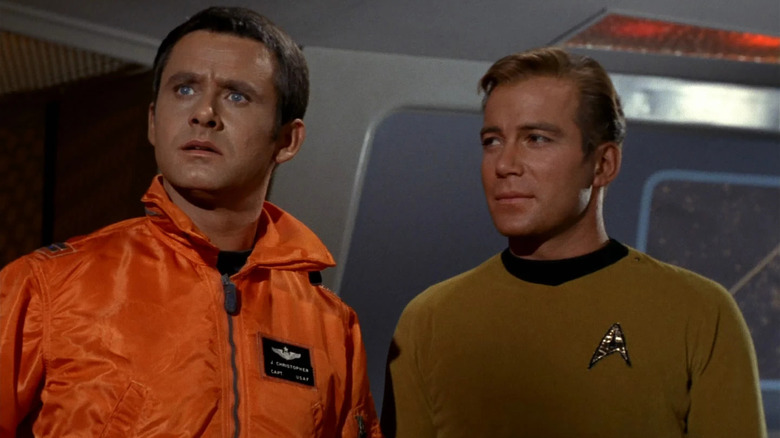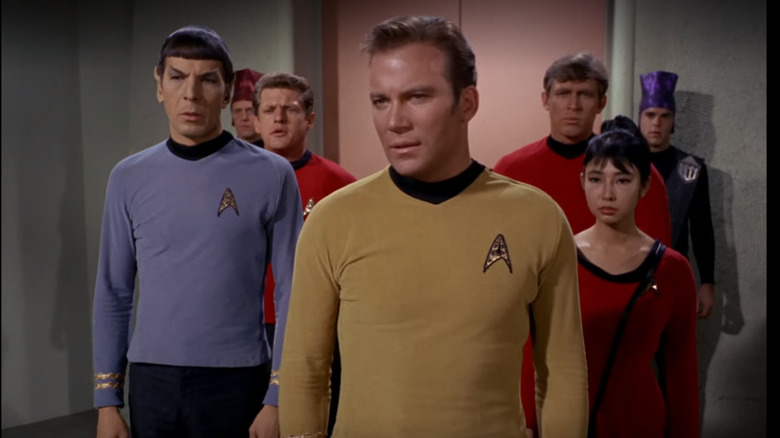Gene Roddenberry Escaped Death Multiple Times Before Creating Star Trek
"Star Trek" creator Gene Roddenberry had a pretty impressive career as a screenwriter, developing one of the most influential and popular science fiction franchises of all time. His legacy through "Star Trek" is truly something, impressing his progressive, humanistic outlook upon the world through the ideals of Starfleet, but even without "Star Trek," Roddenberry is also a (somewhat) secret legend for having survived multiple plane crashes during his time in the military and as a commercial pilot for Pan American World Airways (Pan Am). His work on "Star Trek" is much better known, of course, but the incredible stories behind his near-death experiences as a pilot help afford fans a better understanding of the man who gave us Captain Kirk, Spock, and the whole beautiful, utopian universe of "Star Trek."
(Sure, he originally pitched "Star Trek" to studios as a space Western, comparing it to the popular series "Wagon Train," but his own idealism was bound to seep through.)
When it comes to Roddenberry's extremely eventful career as a pilot, the stars seemed to align to keep him around long enough to make "Star Trek" — though, sadly, not everyone he crashed with shared the same fate. It's no wonder that Roddenberry eventually left aviation, though not before he battled America's enemies and saved some lives.
Roddenberry cheated death in the Air Force
Gene Roddenberry was called upon to fight for his country after the attack on Pearl Harbor in 1941. By September 1942, he was serving as a pilot fighting in the Pacific Theater of World War II. At only 21 years old, Roddenberry was dealing with terrifying tropical weather, incoming enemy fire, and mechanical failures all while trying to keep his plane aloft, which sounds pretty hellish. Unfortunately, he ended up experiencing two crashes in the military — one as a pilot and one as a passenger. The more significant and well-documented crash happened on August 2, 1943, when Roddenberry, piloting the "Yankee Doodle," had difficulty getting enough lift on the runway on a disputed South Pacific island and crashed into the trees, killing two of his fellow airmen. Investigations into the crash cleared Roddenberry of fault, but he reportedly took it hard and blamed himself for their deaths.
Roddenberry recounted a second crash later in life, though he was a passenger and there were no fatalities. He told biographer Alexander David that he pulled several men out of the burning wreckage during a small military operation that ended with the plane going down. He once said to a friend that maybe pulling those men to safety helped make up for the "Yankee Doodle," which clearly still bothered him. He was honorably discharged from the Air Force in 1945 as a captain and was awarded both an Air Medal and a Distinguished Flying Cross – although his most heroic moment was yet to come.
The Pan-Am plane crash that changed Roddenberry's life
In an amazing but true story perhaps best documented by the comic The Oatmeal, Roddenberry was responsible for saving more lives when he was co-piloting a Pan Am passenger flight across the desert and there was a major mechanical failure. As the plane burned and plummeted from the sky, he reassured passengers and helped them into crash positions, then he proceeded to pull people from the wreckage despite his own broken ribs.
Investigations were made into what caused the tragic crash, but eventually it was revealed as being something maintenance should have caught and Roddenberry as a co-pilot had no control. It was a refrain Roddenberry grew tired of hearing, with yet another mechanical issue causing another near-crash for the young co-pilot that the airline couldn't quite pinpoint. Worried about making his wife a widow and his new infant daughter fatherless, he resigned from Pan Am in May of 1948.
Initially, he thought about making a living as a poet, but soon latched onto the idea of working as a writer. He subsequently moved his family to southern California and worked as an officer with the LAPD while making a name for himself as a freelance screenwriter. By 1956, though, he'd resigned to pursue a full-time career in TV and would make history with "Star Trek: The Original Series" just eight years later. Roddenberry could be notoriously difficult to work with; he was sent away from "Star Trek: The Motion Picture" and had an adversarial relationship with "Star Trek: The Next Generation" star Patrick Stewart. Still, after surviving all that he did, maybe Roddenberry had earned the right.


